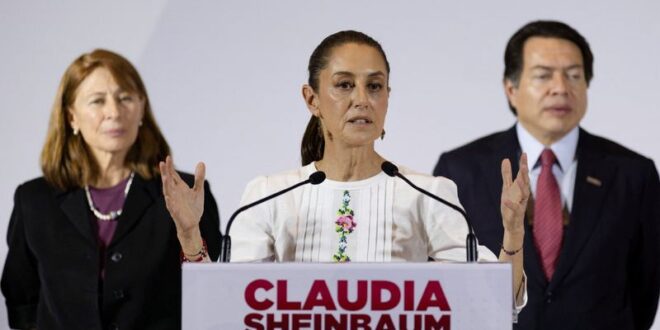MEXICO CITY (Reuters) – Mexico’s presidential candidates will start their campaigns on Friday for elections in June, with the ruling party candidate leading in a race that will likely crown a woman to lead Latin America’s second-largest nation for the first time.
Former Mexico City Mayor Claudia Sheinbaum, who is running under a coalition led by current President Andre Manuel Lopez Obrador’s leftist MORENA party, holds a comfortable 20 percentage point lead over former Senator Xochitl Galvez, who represents the opposition coalition.
If Sheinbaum wins, the 61-year-old scientist and close ally of Lopez Obrador has committed to carrying on the policies that have made the current president very popular, such as combining strong social welfare programs with fiscal discipline that has helped boost the Mexican peso.
Sheinbaum has also said that she will seek to cash in on the so-called nearshoring trend of multinational firms relocating supply chains closer to their final destination.
The candidate has also promised to tackle rife insecurity, which despite improving by some metrics under the current administration, still puts Mexico among the most violent countries in the Americas.
Beyond the presidency, Mexican voters will also cast their ballots on June 2 for lawmakers in both chambers of Congress, eight governorships, as well as the Mexico City mayoral post and thousands of other local officials.
As Sheinbaum’s chances of winning are good, analysts say MORENA is targeting its efforts on obtaining the majority needed in the lower house and the Senate to pass constitutional reforms meant to cement Lopez Obrador’s legacy without requiring opposition votes.
“With the presidential race looking increasingly decided, Lopez Obrador is focusing on winning two-thirds majorities in both houses of congress to modify the constitution without support from opposition parties,” said consulting firm Eurasia’s Daniel Kerner.
In the 2018 elections, MORENA claimed a two-thirds majority in the lower house and came close in the Senate. However, it was not until after the 2021 midterms, which saw MORENA’s supermajority slip away, when the party began pushing for constitutional reforms.
The message from opposition candidate Galvez, an outspoken politician and businesswoman with indigenous roots, that Lopez Obrador has mishandled the economy during his term has not resonated with most voters, who believe their financial situation has improved under his tenure, polls show.
Unemployment is at a historic low of 2.7%, while poverty in 2022 fell to 36.3% from 41.9% in 2018, when Lopez Obrador took office.
“Voters are largely satisfied with Lopez Obrador’s results,” Kerner said. “Galvez will struggle to depict the (MORENA) administration as posing a threat to family incomes.”
(Reporting by Diego Ore; Writing by Kylie Madry; Editing by Christian Schmollinger)
 BeritaKini.biz Berita Viral Terkini di Malaysia
BeritaKini.biz Berita Viral Terkini di Malaysia





